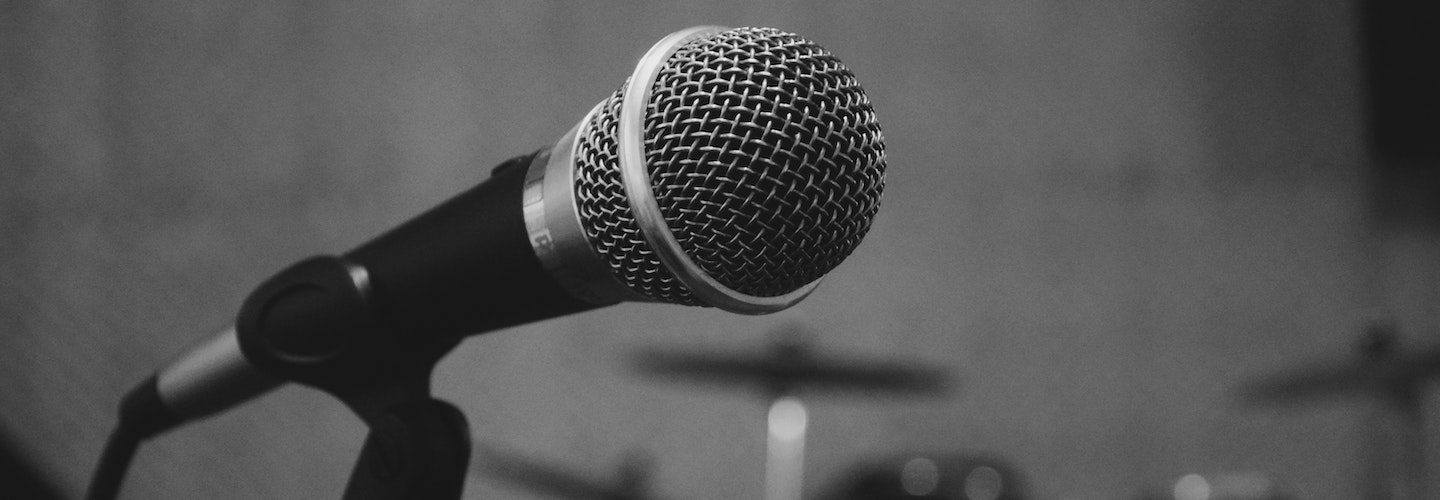I remember the exact moment I decided to start a podcast four years ago. I enjoyed a dinner with two friends in New York city so much that I wished I had recorded it. For two hours, over fantastic Persian food, I basically interviewed two brilliant scientists between bites of fesenjan. Although it wasn’t the first time that I wanted to record the insights of other people, that particular conversation spurred me to begin the podcast journey. July 2 marked the three year anniversary of The Drive.
We started the podcast on a 12-episode test run in late June of 2018, on the cusp of what has become a Cambrian-like explosion of podcasts in circulation today. Admittedly, I started the podcast for selfish reasons. I am always trying to learn things I don’t already know and perpetually have a bunch of questions that I am trying to answer. I also wanted to record meaningful conversations and share them with other people who could listen in.
Over 165 episodes and three years later, my intention hasn’t changed much, but the podcast operation has definitely evolved, taking on a life of its own. Each podcast episode requires about 40 hours of preparation, give or take, which includes my team working on a document about the podcast guest, the guest’s work, any pertinent background information on the given topic space, and my review thereof. The shortest of these documents was 10 pages (only happened once!); more typically they are 30 to 40 single-spaced pages. The post-production for each episode now includes audio and video, since we started video recording the conversations for our YouTube channel. I even built a mini recording studio in my office where I sit (or Zoom) with guests, trying to make it feel like we are in-person if it is over Zoom. Since a lot of the motivation to produce the podcast comes from wanting to build a knowledge base, I wanted quality in-depth shownotes that accompany each episode, which by my audit, accounts for another 20 to 30 hours of work for each episode.
We have received some feedback expressing that it can be difficult to get through one new episode every week, due to the technical nature and depth of many of the episodes. Suffice it to say that getting deep in the weeds on a given topic does not necessarily make for a quick listen, especially if you want to thoughtfully sit with the content. (I must admit, I need to go back and listen to about 10 to 15% of the episodes in an effort to reinforce what I learned, which probably says something, given the time I put into preparing and the fact that I’ve already listened once during the actual recording.) Since I want to optimize the most beneficial way of sharing information on this podcast platform, I thought to try an experiment: we are going to take off one new episode release per month during the summer (though the AMA’s will still continue at the regular pace of one per month). I figure this will allow listeners to catch up on longer episodes and go through shownotes, and also allow the opportunity to (re)visit past episodes, which may be new for a lot of you. A complete episode archive can be found here. If you want some help deciding which episodes to listen to, or are curious about a certain topic, have a look at the topics page here.
The podcast is one of my favorite extracurricular activities. It is a great privilege to talk across a wide range of topics with people I wouldn’t ordinarily be able to speak with (at least in such length and depth). It is the greatest “forcing function” to drive my learning at a rate I could never keep up organically. And I have also loved how the episodes and shownotes have become a resource for my patients and for the general public alike. I want to make the podcast as beneficial and enjoyable for you as possible, so I welcome your feedback on three things.
First, let us know if you find value in the newly added video content, including shorter clips for each episode released. Second, let us know what you think about one less new episode per month. It is our hope that you are given the opportunity to receive the (sometimes technical) information in a format and cadence that works for you. Third, please suggest people you would like me to interview and topics you would like to see explored in depth. Although we may not be able to respond to your feedback directly, we will be reading it all. Thank you for partaking in our varied experimentations over the years, and I look forward to more exciting endeavors ahead!






Peter and Team, firstly thanks so much for everything you do – it really is incredible work.
On the question of future topics, it would be great if you could explore the topic of cellular senescence and the early / emerging science of senolytics and senotherapeutics as an approach to tackling root causes of aging-related disease.
I know that there is a team at Mayo doing early human trials using existing drugs for this (eg James Kirkland), and one of them could make for an interesting guest. The science sounds interesting and promising, but it would be nice to hear your critical appraisal.
Many thanks!
I’m in the less frequent, deeper dive camp. Less d/t info overload – tho that too at times – and more d/t only 20 min commute to listen. 20+ yrs NP in Hem-MedOnc. Much of what interests me are the deep dives. and interviews w/MDs & PhDs/researchers/activists/longform journalists at the leading edge of fields adjacent to mine. Interest is personal and professional. Esp. intersection of glucose metabolism, exercise, fat metabolism, gut health. Helps with many questions from patients recently diagnosed, or survivors wanting to improve overall health. Recent interview with Dr. Amanda Smith was very informative for personal/family reasons. And . . . Interviews w/Paul Offit, M.D. and Peter Hotez, M.D., were the best sources of Covid/vaccine info (and Autism parenting share – always helpful) out there. I always appreciate your questions in the interviews.
I appreciate the time and effort your team puts into the podcasts.
I do not watch the video versions. I look forward to the next podcast and would not like a reduction in the frequency . Sticking to technical topics would be appreciated. Updates on metformin,rapamycin and nootropics would be interesting.
Suggested podcast guest: Jonathon Sullivan, MD, PhD. Now retired from the practice of medicine (Jonathan was an associate professor of Emergency Medicine at Wayne State University/Detroit Receiving Hospital), he is co-author of The Barbell Prescription (“Strength Training for Life After Forty”) and owner of Greysteel Strength and Conditioning in Farmington, MI (www.greysteel.org). On his website Jonathan has, among other inspiring content, a video of a then 92-year-old client deadlifting 235 pounds.
Jonathan plainly shares your passion for extension of lifespan and healthspan, and is particularly focused on the benefits of strength training for those, as he puts it, in the second half of life. Jonathan is articulate, funny, and thoughtful, so I don’t doubt he would make a good podcast guest. While there is much that Jonathan and Peter would agree on, there are some interesting points of disagreement. For example, while Zone II training is one of Peter’s four pillars of fitness and conditioning, Jonathan recommends that masters athletes use HIIT for their conditioning work, and avoid long slow distance exercise. (“High-volume, low-intensity work is poorly suited to the needs of the master, does not train the entire bioenergetic spectrum, and interferes with strength training.” [The Barbell Prescription, p. 279]). And while Jonathan programs the overhead press for any master whose shoulder mobility will tolerate it, Peter has deemed the benefits of this exercise not worth the risk. So in both the areas of agreement and in the areas of disagreement, I think there is the makings of a fascinating and instructive discussion.
I have been a faithful listener to The Drive since the very beginning and a paid subscriber for a couple of years. You and your team are getting so much right that I continue to listen, but I find myself listening to fewer shows in their entirety. You have off the chart intelligence, know the subject matter as good, if not better than many of your guests, and go deep with facts and data – which is good! I always walk away more informed with knowledge, and, more importantly, I comprehend the information source. Your show notes are beyond impressive too.
Two areas that I think could be improved upon are:
1) Framing the strategy or reason for the talk in the grand vision of the mission of The Drive. Sometimes it feels as if the podcasts are random and mainly connected to what you like at the time.
2) The length of the average podcast is becoming extreme. 2.5 hours on a topic is enormous, especially if the time spent on the topic’s core is maybe half of that time. Yes, it is better to have more information, but I don’t think that the average listener has the time to complete each podcast. Less is more sometimes. (By the way, I am into cars (60’s Porsches) and watches – and welcome those skewed discussions!)
Keep up the great work!
Hi Peter,
Your podcast is essential listening and reading for me, especially now that I just completed my fellowship in Sports Medicine and will be starting in outpatient practice on my own this Fall. The topics you discuss are timely and informative, and help me continue to improve. Glad that you are planning on continuing the podcast. It is one of the few online subscriptions that I make time for.
1) I really like the YouTube content, including the short clips. I like to watch clips when I get home, and it allows to curate which ones I like. I have gotten in the habit of watching a lot of my podcasts, yours included. The Show Notes are what makes your podcast a cut above.
2) No problem with less podcasts. The quality is excellent. I tend to be about 2-3 podcasts behind as I make my way through each in 7-10 days. Of course I will not complain with keeping the current rate!
3) I have a personal experience with Testicular cancer, and while it is one of the most treatable, it is always good to hear about the latest in the field.
Thanks for what you do!
I’m good with the lower frequency.
I don’t use the video component.
I’d love for you and your team to look into cell phone radiation/SAR and any advice on this. There was a talk from Australia that seemed legit, but it’s hard to know what to think with so many conflicts of interest.
Really enjoy the Podcast! Keep up the great work!
Although I am not a paying member I do listen to the podcasts that are relevant to my health. When watching the longer podcasts I enjoy the Zoom format. It is both informative and entertaining to watch professionals sharing their insights.
Perhaps you might include a donation button for people like me who didn’t plan well for retirement, lol. Occasionally donating works better for my situation.
As long as you are willing to step outside the box I will continue to read, watch and listen to your content.
Personally I don’t find that video adds anything because I either on the go or at home but following on show notes. I think one episode/week is fine.
Suggested guests: Andrew Yang, Yuval Noah harari, Jack Dorsey, Louis CK, Coleman Hughes, Sidharha mukherjee
First, thank you Dr. Attia and the whole team! I primarily listen and read show notes, so video is not important to me–except for demos, e.g., Beth Lewis & Michael Rintala. I want to be respectful of your time, but other than that, for me the more episodes the better!
I would like to suggest for a future episode a discussion of tips and tricks an average person can use to shoehorn or manipulate the everyday health care system to work a little more like Dr. Attia’s practice, perhaps by interviewing a great primary care practitioner working in the world of insurance/medicare and/or by talking to a great administrator who knows medical billing.
I would also suggest: mitophagy, the heart, genetic tests/results, vitamin K2, the microbiome, Dr. Josh Rabinowitz, MD and Dr. Majid Fotuhi, MD (a practicing physician/educator on brain issues, who–quite literally–saved my life 10 years ago when no one else seemed to have a clue), Satchin Panda, PhD, Valter Longo, PhD and Bruce Ames, PhD; plus new episodes with Chris Masterjohn, PhD, Dr. Rick Johnson, MD, Rhonda Patrick, PhD, Navdeep Chandel, PhD, Dr. Ronald Krauss, MD, Paul Grewal, MD and Matthew Walker, PhD. Thanks again to everyone for such a fantastic podcast!
I love the podcast format. I typically listen while in the car, so I do not watch the video component and am okay with the reduced frequency. As someone who thought he had conquered acid reflux until recently, I would love a deep dive into the topic. Keep up the great work!
The podcasts are unique and very informative. I really appreciate the detail. Sometimes it is difficult to hear your guest (the sound seems faded). I wonder if improvement can be made. Thanks for the great content, Dr. Attia!
Some more interviews on the topics of aging & its relation to anxiety & worry & depression. Also since you are involved in racing it would be great to hear some interviews with people in that area.
probably my feedback wont line up but its here FWIW.
First of all, the video is not that helpful. My primary way of consuming the content is listening (perhaps more than once) with show notes as a reference. The video is just a distraction and something I presume is not easy to produce/make. I would have no issues getting rid of it.
Second, about dropping the 4th episode to digest. I digress strongly. Lately the podcast topics have been really diverse and I have not been that compelled to listen/follow every episode. I am bringing this into context with discuss with Dr Lipid, Dr Mootha etc. Those were hard charging. So, I would really miss a 4th episode.
I think is ok to do 3 podcasts per month but I would like to have access to other info, docs, manuals, protocols that you have like the jetlag protocol. Thank you
Another listener since episode one here.
I’m surprised you haven’t interviewed Steve Horvath yet. Or are you waiting for something? ; – )
Cheers,
Nick.
Hi Peter,
I’ve been a reader of your work for a long time and naturally followed when you began your podcast journey. Before COVID, I would queue up a bunch of podcasts and listen in my car whilst on periodic long drives to customers for work.
However, since COVID hit watching on YouTube has become my preferred option. I can put the video on a 3rd screen, turn up the playback speed to 1.25x or 1.5x (which I always have done listening in the car previously) and leave running whilst I’m working from home.
I love your diverse interesting topics and in-depth discussions, there are not really anyone else covering the breadth and depth you do. Keep up the good work, and yes, I enjoy the recent video content!
Thank you,
Simon
Peter & team,
Over the last 163 week days I’ve been listening to all the podcasts from 1 through 163 (that wouldn’t have happened if work from home hadn’t occurred) and at the beginning I thought I would have no interest in at least a quarter of them, however, I have to say that every single one has been incredibly informative and interesting which is testament to the work you and your team put into the research you do before the recording. In addition, your incredibly thoughtful line of questioning along with your empathy towards your guests is the icing on the cake as it illicits the most in-depth stories from your guests.
As a result, your podcasts stand head and shoulders above all others that I have listened to and that’s before we even get to the show notes.
For the above I have to say a big thank you.
Certainly I can say that one of your podcasts is the perfect accompaniment to an hour of zone 2 training.
From the laypersons point of view (non-medical practitioner) they hit the spot from a 1 time listening perspective, so in some respects I’ll be a little disappointed to have one less per month going forwards (once I’ve completed the full set this week).
For potential future recordings, it would be amazing if you could interview Jackie Stewart as I’m sure you would agree! For particular topics, I echo another respondent on the subject of cellular senescence and senolytics and maybe deeper dives into some of the other supplements that are touted about and why they may or may not be worth taking. Lastly I think it could be interesting to hear from a deep thinker on the ageing topic like Josh Mittledorf.
Once again, many thanks for all the hard work you put in and your willingness to share with the rest of the world.
I would love to hear you interview Gilbert Welch on the risk-return profile of screening tests and the difficulties in communicating medical risk.
First and foremost, a huge thanks for the most interesting and useful podcast on the market!
#1: I definitely enjoy the video content, but I’d still be happy customer without them. I usually read the show notes for every episodes and then watch certain video segments. I rarely listen to the audio these days. The show notes are really a game changer.
#2: Definitely fine with one less episode a month, it’s incredible that the team has managed to put out content of such high quality once a week.
#3: David Deutsch could be a really interesting guest who had some interactions with Feynman. He’s had really great talks with Sam Harris in the past and Tyler Cowen recently. As for topics, I would love to see more patient case studies. These were really really interesting and rewarding.